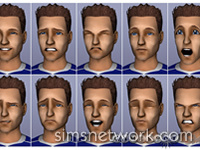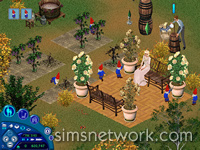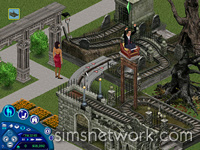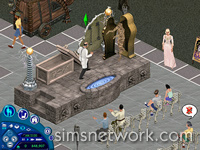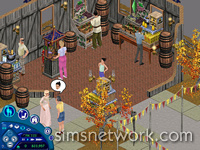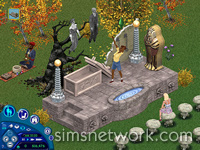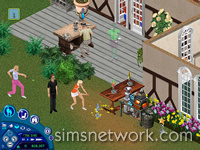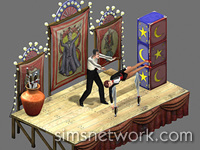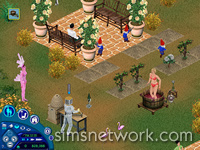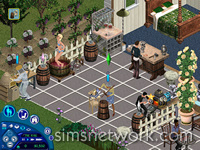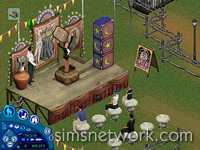Gamespot gets up close and personal with The Sims 2 Creative Director, Charles London.
The Sims 2 Designer Diary #2
Get more details on this highly anticipated sequel right from the designers.
The Sims took the world by storm when it was first released in 2000. The unusual strategy game, which lets you control the lives of autonomous little computer people called sims, went on to become the best-selling computer game ever, and it also gave rise to a series of successful expansion packs that expanded upon the original game with lots of new household items for your sims' houses, as well as new gameplay options, such as having pets or going on vacation. The Sims 2 will attempt to expand on the original game by letting you build bigger houses, create more-detailed sims, and, most importantly, have sims that grow and change over time--sims that start out as children, mature into adults, get married and have kids of their own, and eventually become senior citizens of SimCity. We caught up with Maxis creative director Charles London for more insight into the development of the upcoming sequel.
Up Close and Personal with The Sims 2
By Charles London
Creative Director
 When we set out to make The Sims 2 the greatest game of all time, we knew we had our work cut out for us. After all, we were our own competition. We knew we had to bring every aspect of the game forward to give our players the richest possible experience. The sims had to simply be the most believable, engaging, and truly living characters anyone had ever seen.
When we set out to make The Sims 2 the greatest game of all time, we knew we had our work cut out for us. After all, we were our own competition. We knew we had to bring every aspect of the game forward to give our players the richest possible experience. The sims had to simply be the most believable, engaging, and truly living characters anyone had ever seen.
Making little people that we big people really believe in is hard. We all instinctively know when something is alive and when it's mechanical, when it's real and when it's fake. The sims had to be as real as possible. To make sure we delivered on the necessary level of realism, we went back to the drawing board. We spent time identifying what it takes at the core to convince players that the little characters they see on the screen have real wants, needs, fears, and tastes. Only then could we count on our players caring about them and wanting to affect their lives for better or worse.
We started by giving the graphics of the sims a complete overhaul. When we made the decision to push The Sims 2 forward into a fully 3D environment, we knew we'd be judged against the other top-flight real-time games out there. Bringing the sims themselves to that level of richness meant driving their complexity beyond the bar set by our competition. In The Sims 2, sims will have a much more-complex skeleton that permits a new level of realistic motion. The old paddle hands have been replaced with articulated fingers, and the rigidity of their faces has been replaced with a capability for animated and communicative expression. Their hair now moves as a result of their motion or the wind, and even their clothing can move independently of their bodies.
The sims' skin tones have been improved with regard to color richness and material feel, and the clothing they wear has been enhanced with reflection, shininess, and bump maps. Little details are the key to delivering on a goal of richness. We looked for every opportunity to incorporate these details, including actual teeth, variable eye colors, blinking eyelids, and accessories such as jewelry and eyeglasses.
One of the most important goals when shooting for believability in human form is to develop a balance between recognition and uniqueness. When we look at characters in games, we often respond most strongly to those faces that resemble people we know or have seen elsewhere in the world. At the same time, getting someone to truly care about a sim requires the belief that the character is a unique individual. The variety of facial features needed to achieve this went far beyond hand-sculpting each face, as is the norm in the industry. Instead, we delved into the power that real genetics provides by developing a genome for the sims.
When creating a genetic pool of individual faces for The Sims 2, we defined a huge design space bounded by the familiar faces we all know, and then mined that design space to create literally billions of unique faces. This allows players to feel that their sim is truly distinctive. These faces not only respond with animation and expression, but they also keep their identity as the sim grows up and allow for strong family resemblances without losing any of that precious uniqueness. Players can then tailor the look of their sim to help better illustrate the story they are telling in the game.
Once we brought the physical appearance of the sims into the future by expanding the system's capabilities, we then faced the massive task of bringing their behavior forward to the same degree. The animation engine developed for The Sims 2 permits numerous actions and gestures to play at the same time, providing the ability for the sims to look quite natural and complex in their behaviors. They are able to react to their surroundings, both according to the events around them and according to their various particular personalities. Dozens of facial expressions have been developed to allow sims to express real emotions, such as anger, pity, sadness, joy, and fear. The sims' conversations have been improved by developing a dynamic system that draws upon a rich library of gestures to permit sims to talk in tones that range from lively to bored. Even walking has been improved to allow the expression of emotion and personality, and to permit sims to interact with each other as they pass. Underlying all these advances is a new and improved AI engine that drives the sims' needs, memories, aspirations, and desires, providing the dynamic information necessary to weave together realistic human behavior.
Of course, one set of advances requires another. For example, when you give a character the ability to move its fingers, you then take on the responsibility of creating compelling gestures and animations to drive those fingers. Animation and character modeling are demanding tasks, and success relies on clear planning and a solid aesthetic vision. To that end, planning is always king. To make sure our work comes across as powerfully as possible, we spare no effort to design and redesign the artwork until it provides the most satisfying result. It's not uncommon to walk the halls of Maxis and find animators leaping like they've been shocked, or pretending to open a refrigerator repeatedly, simply to properly internalize the action to get that perfect result.
Finally, executing against those final designs meant scouring the industry for the finest talent available, and we did exactly that. The Sims 2 team has one of the most robust and accomplished art departments ever assembled for a game development effort. Tens of thousands of animator-hours have been spent on crafting subtle and compelling motion for sims and on modeling and painting clothing and accessories to let the players create exactly the sim they have in mind. Speaking of clothing, these are the trendiest sims yet, with fashion choices that are varied and hip. Don't even ask how many catalogs we've perused!
Creating characters that people believe in and care about has always been among the most difficult of creative challenges, since way back in the Stone Age when we told stories by the campfires over roasted mammoth. But that's what we committed ourselves to here at EA, and we're just so excited to see it all finally coming together. At last, we can say that our sims really live and breathe, and that they're so much the little people we always wanted to make that they take our breath away. We just can't wait to introduce them to you.















